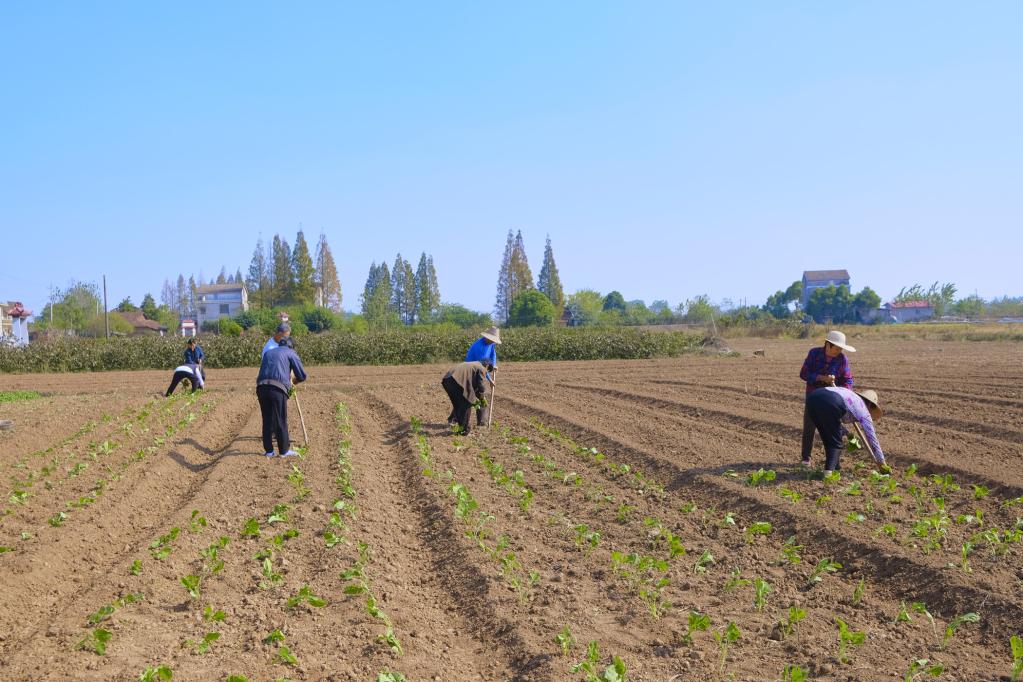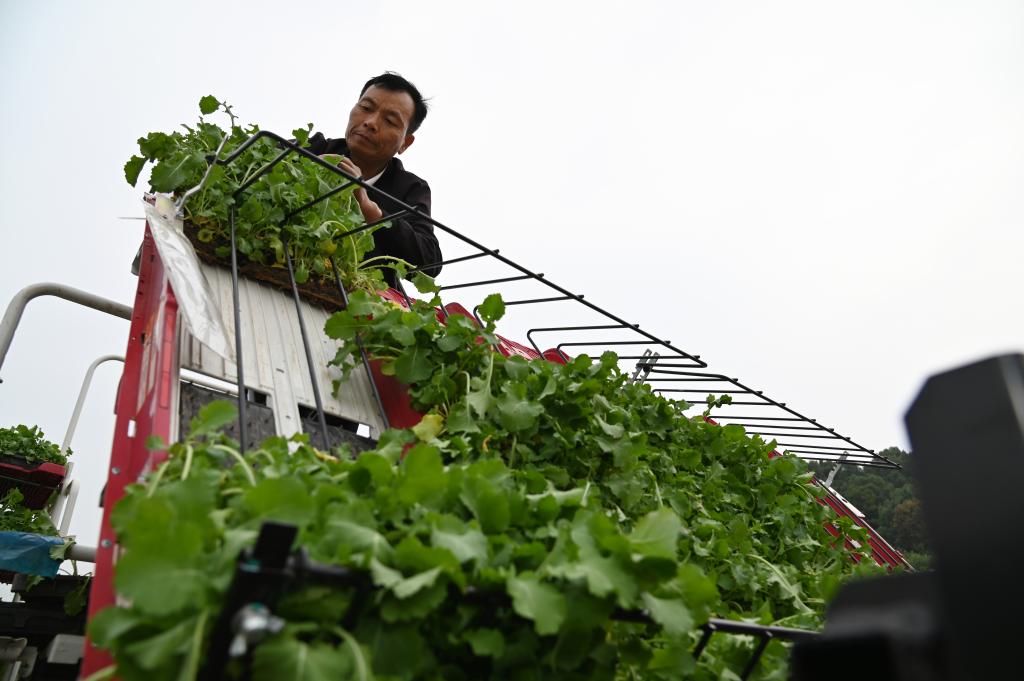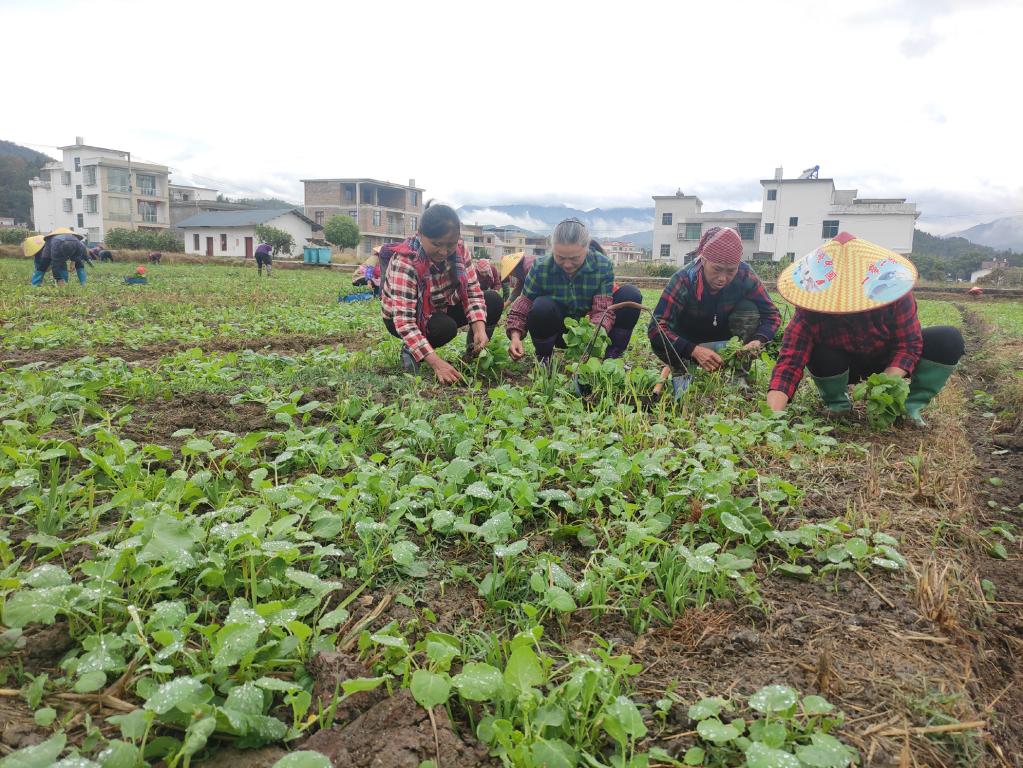Xinhua News Agency, Beijing, November 15th Title: Busy farming in winter fallow fields — — Report from rape cultivation site in some provinces of the Yangtze River Basin
Xinhua news agency reporter
Send seeds and send services; Stabilize the area and increase the output … … Beginning of winter has passed, and the vast fields in the Yangtze River valley are still busy. Many fields planted with rape in winter leisure are "covered with green" for the winter to help farmers increase their income.
Rape was planted in the winter fallow fields.
In the past few days, in the farmland of Zihongzhou Village, Gonghua Town, Yuanjiang City, Hunan Province, the villagers have been busy plowing, fertilizing and transplanting, which is a lively scene.
"When the farmland is idle during this time, I will switch to rape, which will not only improve the soil quality, but also increase my income." Jianxin Guo, a large grain grower in Zihongzhou Village, got up early as usual and went to water his rape field. The rapeseed sown not long ago has a little new green.

The picture shows the villagers planting rape in Zihongzhou Village, Gonghua Town, Yuanjiang City, Hunan Province. Xinhua News Agency (photo by Wenjie He)
Rape is an important oil crop in China. Dun Xiaoling, an associate researcher at the Oil Crops Research Institute of the Chinese Academy of Agricultural Sciences, said that rape planting in China can be divided into winter rape producing areas and spring rape producing areas, of which winter rape accounts for more than 90%, mainly distributed in the provinces of the Yangtze River Basin.
This year, the No.1 Document of the Central Committee proposed to vigorously implement the soybean and oilseed production capacity improvement project. Hubei, Hunan, Jiangxi, Anhui and other provinces in the Yangtze River Basin have preferential policies, promoted improved varieties, strengthened science and technology, and encouraged farmers to expand rapeseed.
Hubei continues to tap the potential of fallow fields in winter. This year, it plans to expand the sown area of rape in autumn and winter by another 500,000 mu to ensure that the sown area of rape in summer reaches 17.7 million mu.
"The county provides us with agricultural machinery services, seeds and fertilizers. My 50-acre field is all planted with rapeseed." Liu Chenghong, a villager from Zhangchi Village, Zengji Town, Shayang County, Jingmen City, Hubei Province, said that the purchase price of rapeseed this year is about 3 yuan per catty, which is a few cents higher than last year, and everyone has a high enthusiasm for planting.
In Xuba Township, Yi ‘an District, Tongling City, Anhui Province, Huang Guohua, a large rapeseed grower, is busy spraying Wang Wang control agent with drones. "Rape has grown to six leaves, so it is necessary to control its growth, make the plants dwarf and develop roots to prevent lodging." He said.
New technology and new agricultural machinery help to expand seeds.
Anhui is one of the major oil crops producing provinces. This year, Anhui Province actively encouraged farmers to expand rape planting in winter fallow fields, an increase of 1.1 million mu compared with last year.
"In the afternoon of this year, the yield of rapeseed generally exceeded 400 kilograms per mu, and some high-yield fields reached 500 kilograms per mu." Zhou Kejin, chief expert of Anhui oil industry technology system and professor of Anhui Agricultural University, said that it is necessary to expand the planting area and promote the increase of production and income. In the past two years, through variety improvement and mechanical improvement, Anhui has greatly reduced the loss rate of rapeseed harvesting, and at the same time, through screening and integrating high-yield and high-quality planting models, it has told large farmers to make them more confident and confident.
The application of new seedling raising technology and agricultural machinery and equipment is also helping to expand rape seeds in the Yangtze River basin. At the beginning of November, in the smart agricultural seedling factory in Shanbei Village, Xicun Town, Yuanzhou District, Yichun City, Jiangxi Province, the green rape seedlings on the seedling tray grew gratifying. Fu Dafu, a big planter, drove agricultural machinery and completed the planting of more than 10 acres of rapeseed seedlings in one morning. "With the nursery factory, the planting efficiency has been greatly improved. There will be no delay in raising early rice seedlings next year, the land will be used and the fertility will be better! " Fu Dafu said.

The picture shows Fu Dafu, a large planter in Shanbei Village, Xicun Town, Yuanzhou District, Yichun City, preparing machine-inserted rape. (Photo courtesy of Yuanzhou District Network Emergency Command Center)
Gao Suli, an agricultural extension researcher at Yuanzhou District Bureau of Agriculture and Rural Affairs of Yichun City, told the reporter that this is a newly introduced technology this year. By cultivating rape seedlings into machine-transplanted seedlings, the whole process of mechanized planting can be realized like rice, that is, ploughing and planting, saving time and labor. "In order to reduce the losses caused by drought, Yuanzhou District has adopted rice tanker farming and centralized seedling raising to guide farmers and cooperatives to implement mechanized production of farming and harvesting."
There is still great potential for capacity improvement.
In order to actively expand rapeseed, some provinces in the Yangtze River Basin have launched "gift packages" to benefit farmers according to local conditions.
This year, Hunan invested nearly 1 billion yuan to support rapeseed production, mainly used to subsidize the cost of rapeseed production, covering 96 counties (cities, districts). Hubei supports family farms, farmers’ cooperatives and other business entities to undertake more tasks of seed expansion, and build a batch of "100-acre research fields, 1,000-acre demonstration plots and 10,000-acre construction films" to drive rapeseed to stabilize production and increase production.
According to the statistics of Hubei Rape Office, the rape planting area in the province has increased by more than 5 million mu in the past three years. The rape industrial chain is gradually extended and its functions tend to be diversified. By using oil, flowers, honey, fertilizer, vegetables and feed, Shayang County, Jingmen City has implemented the whole industrial chain layout and multi-functional utilization of rapeseed industry, with a planting area of 700,000 mu, which has boosted the whole industrial chain of nearly 3 billion yuan.
"We will plant 1,000 mu of rape in the whole town this year, which will not only improve the land use efficiency of winter fallow fields, but also see the beautiful sea of rape flowers next spring." In the high-standard farmland of Shangwan Village, Yingqian Town, Shangyou County, Jiangxi Province, Zhou Dongping, the head of Yingqian District of Jiangxi Xinhe Ecological Agriculture Development Co., Ltd., told the reporter that Yingqian Town is building a "two thousand acres" contiguous rape base to make the rape industry a new bright spot in the integration of agriculture and tourism in the town.

The picture shows the villagers in Shangwan Village, Yingqian Town, Shangyou County seizing the opportunity to plant rape. (Photo courtesy of Shangyou County Media Center)
At the same time, some interviewed experts also said that there is still great potential for expanding rapeseed in the Yangtze River basin. Dun Xiaoling said that at present, the average yield of rapeseed in China is about 135 kilograms per mu, and the oil content of most varieties is about 43%. China has bred a number of new varieties with high oil content. In the future, through the combination of improved varieties and good methods, agricultural machinery and agronomy, the yield and oil content of rapeseed still have room for improvement. (Reporter Hou Wenkun, Chen Chunyuan, Zhou Mian, Shui Jinchen)